Explanation of the current crisis (essay)
Global Capitalism. 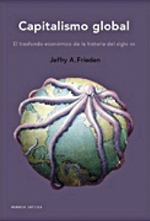
The economic background of the history of
the twentieth century.
Jeffry A. At Fried.
Critical Report
2006.
726 pages.
The book tells the history of the 20th century economy: Keynesian view of the author in galbahe. By their way of telling, it's very interesting for those of you who have liked the economy but haven't gone deeper into the history of the economy. Divide this story into four main blocks: The first globalization until 1914,
a special time between the two world wars, the decades of the welfare state after the Second World War and the current process of globalization or globalization. As it advances along the lines, the reader soon discovers the great importance of economic events in historical evolution and undoubtedly contributes to understanding the current economic crisis. Although each period of crisis has its characteristics and context, hardly anyone can say that the financial crisis that is occurring in the rich countries is nueva.El book makes it easy to understand the enormous economic growth of
the twentieth century worldwide. The author is passionate about globalization, but critically analyzes its evolution and believes that globalization should be controlled. The book also presents some important shortcomings: for example, it offers very few lines to the importance of the military perspective in this globalisation and does not even refer to the deplorable consequences that the size of economic growth has on the sustainability of the planet.
Xabier Latvia
Involuntary writings (Lukukasuna)
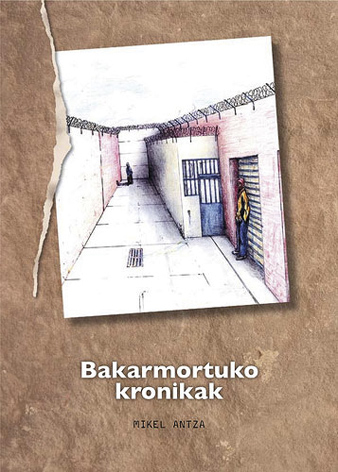 Chronicles of
Chronicles of
Bakarmoru Mikel Antza / Ataramiñe.
The chronicles of Bakarmoru are the book of prisoner Mikel Antza. Written between October 2004 and June of 2005.El subtitle of the book is for those who did not want to write. Without being a writer, it would be hard for a prisoner to write a testimony of the size. The resemblance suffered total isolation, psychological torture, loneliness and destruction by several hunger strikes. The writer has decided to narrate her experiences and put into verse her destiny offered by her imagination. In the space of disabilities and dependencies, in the heart of his wife and son, in the memory of the people, learning by heart familiar songs has helped him to live. He's brought news from the prison dictionary. Bakarmortua is the word of Antza. Prison, being the maze of the maze, is the word that describes it. They also belong to the Behatxuloa dictionary – loan to the writer Sonia González – or Guantamoulins; Guantánamo goan. Nostalgia and falling in love are common words in the prisoner's vocabulary.
Mikel Asurmendi
Food Scandal (Essay)
 Waste. Uncover the Global Food Scandal
Waste. Uncover the Global Food Scandal
Tristram Stuart.
Penguin Books, 2009
Complaint and solutions. Of the two have the book of London activist Tristram Stuart – I have read the Spanish version, Despilfarro. The global food scandal. The figures are frightening: Almost half of what we consume goes to waste in Europe and the United States; large trade disposes every year between 500 and 600 tonnes of food, 40-60% of the fish caught go back to sea, European fishermen go back to sea, about 30% of what is served in school canteens ends up in garbage, EU citizens reject at home almost 20% of food in good condition…
The best thing is that it is a reality that we can avoid. Stuart talks about the measures that should be taken and what is in our hands. It collects ingenious advice, and we know that it is not easy to turn the situation around, but what we can do is not little. Stuart himself has been feeding for years on what he has caught from the containers around supermarkets and it is surprising that the rich foods can be made by recovering the food that has been discarded. Using his experience, he shows us a lot of activities, from theory to practice, and above all that is what makes the book interesting and credible.
Mikel Garcia Idiakez
Salt of the hills (Essay)
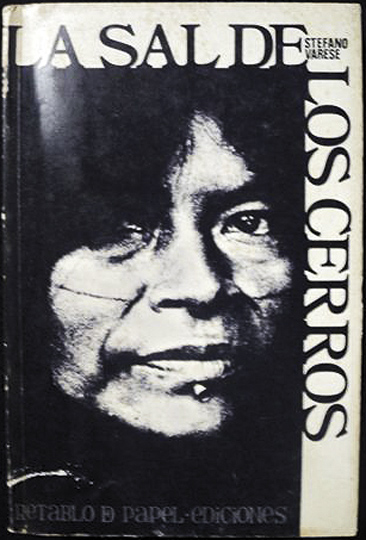 The salt of the Stefano
The salt of the Stefano
Varese hills.
Casa de las Americas, 2011.
If you go to Cuba, I bring you a friend, I assure you. If not, try to get the edition published in Peru in 2006; on the other hand, in English, Salt of the mountain is on Amazon. When you read the almost unknown classic of Stefano Varese among us, you will be cursed by the young man who in the first edition of 1973 had not read it before. If you are young today, you are in time to meet with this great historian and left-wing anthropologist, the history and the being of a small Amazonian ethnicity that has managed to survive for five centuries confronting white European invaders, including the Basques who have approached gospel gunmen as rifles. The epic of the Ashaninka, which the detractors call campa. To the first version of the research work carried out in 1966-1968, in the second part of the book, Varese has added the collection of articles published by Ashaninkez. How to understand Commander Mark or Evo Morales without Varese?
Pello Zubiria Kamino
For democracy (essay)
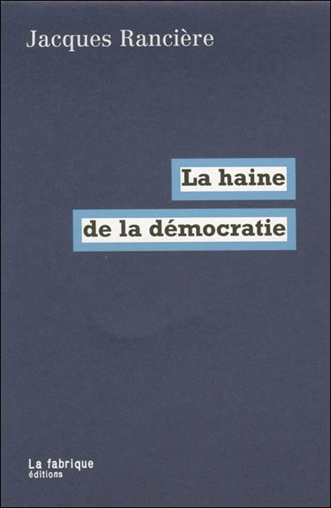 The haine de la démocratie.
The haine de la démocratie.
J. Rancière. La Fabrique, 2005
The conviction that is spreading is that we citizens have lived above what we could and that that is why anguish now comes into the pockets and budgets. It's a rather curious way to explain the economic collapse that we live in, because it makes us think we've had the life of the rich and famous for years, and besides, it doesn't ask what the hell, the caresses and authentic characters have had a demonic responsibility in this cigarette since 2008.
It is not, however, a new line of thought, as I realized after reading this book written by Jacques Rancière seven years ago. Take away the excesses of luxury and put the ability to decide too much, leave the rest of the argument as it stands: there is another crisis, the formula that some have sought to explain what the values of the West live, that we have decided more than we are entitled to and that has made us selfish and individualistic, to the point of not thinking more than consumption.
In this brief and rigorous essay, Rancie states that some intellectuals and leaders understand democracy as an abuse, that the power of the people is uncomfortable and even outrageous to the critics of today’s democracy.
The French philosopher, born in Algeria, wants to address these approaches and, to do so, gives the keys to a definition of democracy, connecting it with concepts such as politics, republic and representation, and with postulates of monolithic capitalism, questioning various ideas of the classical Marxist perspective, for the sake of contingency. “Democracy is, above all, that paradoxical condition of politics, the point at which all legitimacy meets the last lack of legitimacy,” he says in a passage of the book.
The idea of democracy remains innovative and subversive after having read Rancié's explanations on the subject. It's not a bad book for these times when we can make less and less decisions.
Gorka Bereziartua
The Revolution in the Sacristy (Essay)
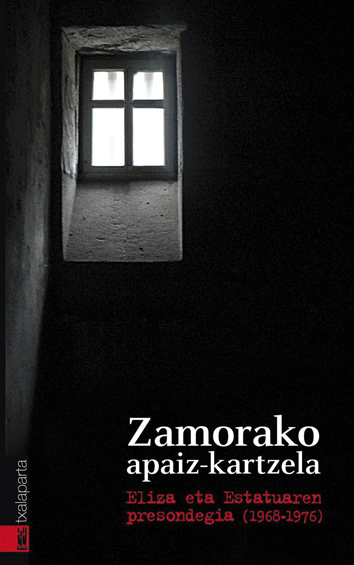 Cural prison of Zamora.
Cural prison of Zamora.
Among many.
Txalaparta 2011.
In the 1960s, the Franco regime was caught offside by young seminarians and priests. In three or four years, they revolutionized the seminars, locked up, denounced the repression, published the manifests, collaborated with ETA... Many priests joined the change that was taking place throughout the Basque Country, and many of them ended up in Zamora's prison.
This book perfectly explains this whole context. The testimonies of eleven people who were in Zamora's prison have the vibratory taste it left, the suspension of the authentic buried tunnels and the attempts to escape, the gunpowder smell of the explosion of an asphyxiating saucepan... The book has crossed borders, and many other countries of the Spanish State that were in that prison have also appreciated this kind of collections.
The book has been prepared by 25 people who lived in the first person those facts, including the collaborator of Argia Juan Mari Arrangi, and has been coordinated by Angel Zelaieta and Edorta Jiménez.
Urko Apaolaza
Jean Baptiste Baigorri: Basque adventurer born in English (Comics)
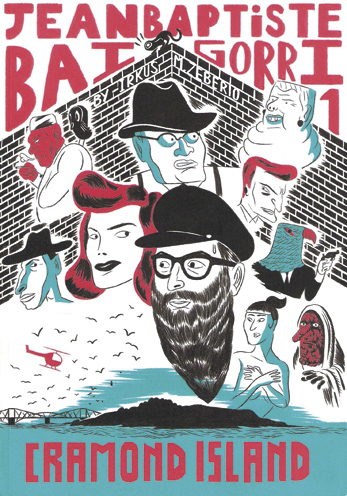 Jean Baptiste Baigorri 1: Cramond Island.
Jean Baptiste Baigorri 1: Cramond Island.
Irkus M. Zeberium.
Nobrow, 2012.
The year was opened with this question the blog Hitzen Uberan: The comic book, at the gates of a flowering? It is known that the comic book is not rooted in Euskal Herria (especially in Hegoalde) and that very few albums are published. It is not surprising, therefore, that last year eight books have been published and considered a flowering time. And in the midst of this poor landscape, finding a “flower” like the one I want to present to you, is like finding an oasis in the desert.
Recently, on a trip to London, I entered the Design Museum. As I took a look at the readers of the library, I saw a lot of comics, and suddenly I was astonished to read the title of one of them: Jean Baptiste Baigorri 1: Cramond Island. By his name, the author was Euskaldun, no doubt:Irkus M. Zeberium. Comic book in English, but with phrases and references in Basque! “The comic book of an unknown Basque author in English and in such a special place! It’s not a bad start!” I said. In the days that followed, I also saw comic books in other bookstores. It looked like it was well distributed.
Thanks to the Internet I learned that the author is Donostiarra and that he went to Barcelona 9 years ago. Specifically, he presented the comic book in May in the Basque Country Etxea in Barcelona. On his website, he defines himself as an illustrator and comic in defense of the new order, adding that he is not a humanoid reptile. And the motto titled Jaun gabe eta legerik ez, coincides with the paramarxist libertarian thought of the protagonist, Baigorri.
Comics is also a libertarian style. To some extent, he has reminded me of the underground style of the United States, comics such as El Vibora or some authors related to TMEO. It uses flat colors. Black and white are added a single color – red or yellow – in many leaves, combining in other leaves or vignettes these colors or green.
As you can read on the website of the publisher Nobrow, Baigorri is a poet, freedom fighter and existentialist superhero. When she learns that her mother is in danger of death, she flees from the sandwiches factory working on counterfeiting. So, her boss, too fat, half in love with her, will send her to look for her terrifying and ugly reared. We will also know of a reincarnation of Karl Marx.
In his epic and absurd adventure, he gets into an anti-capitalist group with the intention of awakening the revolution and with a primary goal: ATMs in Scotland, full of poems that lead the masses to action: until a head can be crowned, the heads can be cut to the crowns. It's not mentioned in the book, but I bet Baigorri has read movies and books about Lucio Urtubia.
Anarchist symbols abound in the comic. We will also see the name of Bakunin painted on the walls and a boat with the name of the mythical book by Marc Legasse and Jakue Pascual: Anarchy.
Although there are not too many geographical references in history, Cramond Island is located in Scotland. We’ll read “Free Scotland” on a wall and the Queen of England appears with her head cut off on Bank of Scotland tickets. Here and there are references to the Basque Country: Last names of the protagonists Baigorri and Etchegaray, Navarre chains with A anarchist in the center, or two phrases in Basque: We will read at the door of a house “What crisis, what life” and Baigorri’s mother will die “Bihotza banoa. The principle is Amaia” he will say.
We will wait for the adventure of this wonderful crew of madmen to continue, in the hope that they will also translate it into Euskera.
Kike Amonarriz
Siestak festa (Children's literature)
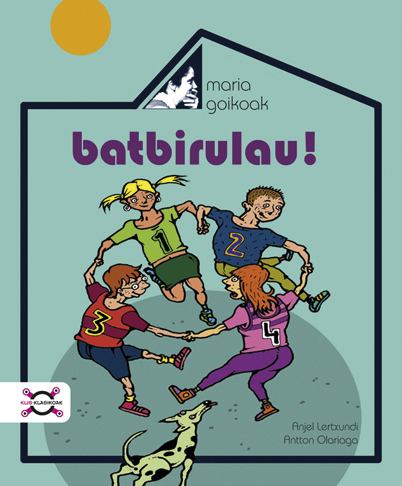 "Oh my God!"
"Oh my God!"
Anjel Lertxundi, Antton Olariaga.
Galtzagorri Association, Alberdania, Erein, Igela, 2011.
My aunts are a party. In those hours you're offered, you're squeezed out by the urge to play, the strength to do something different, the picardy to tempt the reactions of your nieces ... Batbirulau! It can be the album of the rocker aunts, which opens a surprise on every page, all playing with words, all creative... One of those who takes your children out of hand, one of those who puts into tension “the next one I will choose”. What breaks the military reading page by page and line by line, has all the pages and lines upside down. Both when the uncles and nephews of the book are in a fire atmosphere, as when they go to the campsite, or when they enter the world of the map, or when they stumble upon the costumes, the book gives us a little play: singing a song, passing old sayings, making theater, drawing...
Stitxu Eizagirre
Thirst in Martutene (Novel)
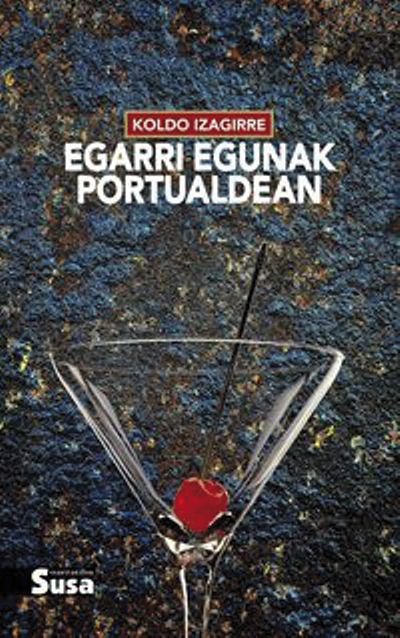 Thirsty days in the port area.
Thirsty days in the port area.
Koldo Izagirre.
Susa, 2012.
In the past, bicycles were for the summer. Now, books. At a time when those who write are more than those who read, you're of that endangered species. Congratulations. You know that it is a pleasure to walk the road in search of gold. You bring joy and illusion. Go to the store or library. Take such and such a book in your hand, read them carefully and carefully, and take the reading on the expedition. The book you choose is the most beautiful path. The joy of discovery! Anyway, if you're one of the stupids living the general uncertainty not only in the rest of the areas, but also in the books, if you live unheading, take the map: Egarri egunak portualdea, empty artwork from Koldo Izagirre, read the paintings of Carmelo Ortiz de Elgea you have in Gernika in your attitude. And here's the map, bis. Martutene, Ramón Saizarbitoria. They're two architects of literature. Did you have to tell them?
Honey A. Elustondo
What is love? (Trial)
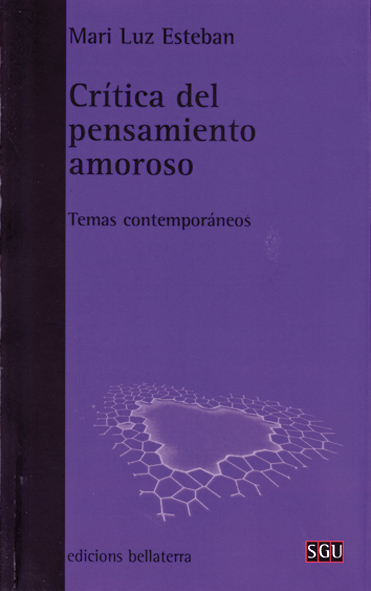
Loving thinking.
Mari Luz Esteban.
Edicions Belcor 2011.
Basauri’s anthropologist and feminist Mari Luz Esteban has spent years exploring love. I wanted to write a book about the “loving thought” that has triumphed in Western society over the past centuries, to criticize the set of theories, symbols and lines. This way of building and living love generates unequal relationships of gender, class and ethnicity. It emphasizes the desire, identity and the concrete and heterosexual way of understanding the subject in itself. In the first part you have the theory, and in the second, the interviews with twelve feminist women and two men, their reflections and experiences about love. Even contradictions.
Onintza Irureta Azkune
Common reflections (Essay)
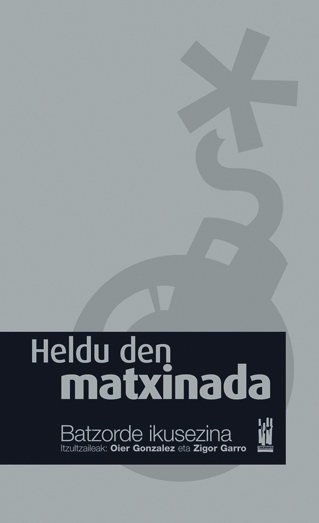
The revolt that has come.
Invisible committee.
Translators: Oier González, Zigor Garro. Txalaparta 2011.
This book was written by the police in a self-managed toilet in the French village of Tarnac, on behalf of an imaginary collective. Starting from the 2005 offensive that was unleashed in the slums of the periphery of Paris, it makes a radical critique of this society shaped by capitalism in the last two centuries. “Because the problems described with the words of society have no solution” is a desperate entrepreneurial rage, this claim to spark a debate beyond the traditional sterile dichotomy of the left and right.
Axier López
The Other Empire (Essay)
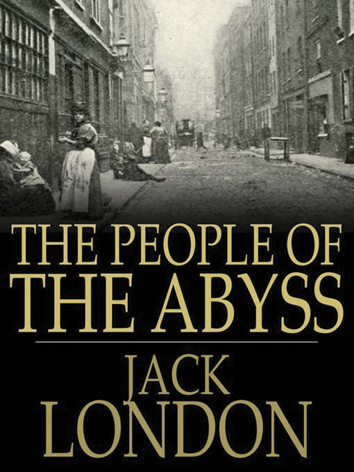 The people of the abyss.
The people of the abyss.
Jack London.
1903.
This one of the masterpieces of journalism is not in Basque, but the reader can find it easily translated into Spanish in the area. In 1902, American journalist Jack London ended up in Model London when, in the golden age of the British Empire, he was becoming overly enriched by blending the corners of the world in the name of progress. The first few days led him to teach the world the dark side of the metropolis. He was seven weeks in the role of a unemployed sailor in the poorest district of the capital. The author intervenes in the first person, in a quick style and without mouths, harsh criticism and political analysis. London offers an image worthy of human misery, witness of a gigantic social injustice. One of these works, without alarm, dignifies the journalism profession.
Lander Arbelaitz
Excluded children and mothers
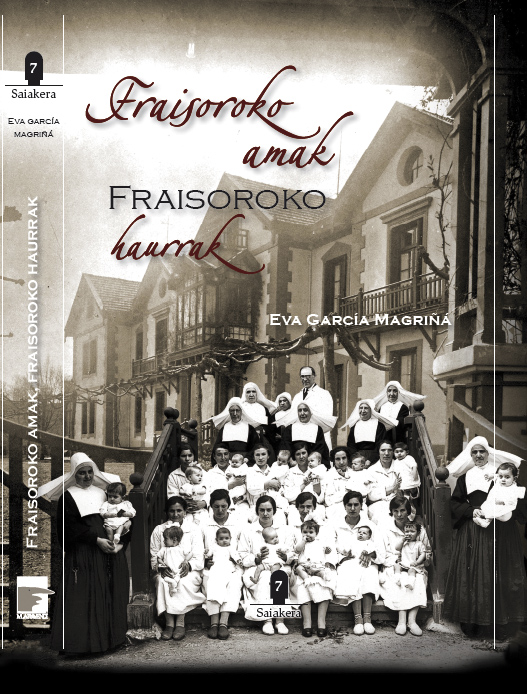 Fraisoro's mothers. The children of Fraisoro.
Fraisoro's mothers. The children of Fraisoro.
Eva García Magkidá.
Larramendi Kultur Bazkuna, 2011.
Bastardos, children around, deserts, exhibitors… From 1903 to 1980 they welcomed thousands of abandoned children in the Fraisoro house of Zizurkil, and Eva García explains the creation and evolution of Fraisoro through data collected over two years. But it has also used the voice of the protagonists, who have collected testimonies from people who worked in Fraisoro and children, as well as mothers. The author, on the cover, has put the mothers ahead and, in the background, explained that along with the children, and many times before being a child, they also received the mothers Fraisoron, that society rejected the children and the madres.Así, Fraisoro has unveiled a cruel and uncomfortable reality that was wanted to hide and silence at home.
Nagore Irazustabarrena
In the search for reality

Quantum.
Manjit Kumar.
Elhuyar, 2011
The finding of the Higgs boson, in the absence of definitive confirmation, has closed a chapter in the history of quantum mechanics. Quantum, written by the philosopher and physicist Manjit Kumar, narrates the beginning of this story. Kumar has used as a thread the biographies of its protagonists to describe the scientific revolution that took place in the first third of the last century. In this way, in addition to the work they did, we will be better acquainted with the hallmarks of Einstein, Bohr, Planck and many others. As the cover page denounces, the author has long discussed the controversy between Albert Einstein and Niels Bohr; it should not be forgotten that Einstein never accepted aspects of quantum mechanics, although he did a fundamental job in its development. It's not an easy book, but it's very interesting. And very suitable to remember that great scientists were also people, with their weaknesses.
Unai Brea
Baditu –besteren artean– bi gabezia euskal literaturak: liburu elektronikoen urritasuna eta literatur lanen ibilbide laburra. Aritz Brantonek Booktegi ataria sortu du joera horiek aldatzeko. Euskarazko lanak formatu digital zainduan eta doan eskaintzen ditu bertan... [+]
Nobela mardul batekin itzuli da Ramon Saizarbitoria (Donostia, 1944): Lili eta biok eleberriak Faustino Iturbe psikologo ohi eta idazlearen eta Lili izeneko hamabost urteko neskaren istorioa kontatzen du.
“Ekintzetarako beharrezkoa duk erokeria gramo bat” irakurtzen da Ehun metroren lehenbiziko orrietan. Horixe, erokeria txiki berri bat da, Xabier Olarrak proposatu duena, egingarria akaso.
Ramon Saizarbitoria idazle donostiarraren Martutene nobelak irabazi du Literaturako Euskadi Saria. Iñaki Mendigurenek eta Sarah Turtlek irabazi dute itzulpenekoa Mark Twainen Tom Sawyer-en abenturak euskaratzeagatik.
Ramon Saizarbitoria donostiarraren Martutenek (Erein, 2012) jasoko du 2012ko 111 Akademiaren Saria. Orain arte ‘Beterriko Liburua’ izenez ezagutzen zen aipamen honek urteko euskal libururik onena saritzen du.
Etxe dotore bat, higatutako harremanak eta halako lasaitasun estu bat giroan. Donostia. Martutene. Ramon Saizarbitoriaren azken nobela da jarraian datorren elkarrizketako gai nagusia. Hariari tiraka ordea, idazleak beste hainbat gairi buruz dauzkan iritziak azaldu dizkigu.
Laurehun lagun erreleboka Arriagan; hitza hitzari segika. Deskribapenak eta elkarrizketak; orrialdeak eta kapituluak, nobela bat, Ramon Saizarbitoriaren Hamaika pauso oso-osorik errezitatu arte. Badator klasikoen IV. irakurraldia Bilbora.